TR: {UAH} Genocide in Rwanda in 1994: the positive role of Muslims
Very amazing story!
However, who can tell us why some of these Muslims people are now in the same Rwanda accused of joining the terrorist ISIS? What has happened to these good ladies and gentlemen? Of course, we are aware that human being has always a portion of dark behaviour! Better to check if we are not manipulated with pure propaganda.
Envoyé : mercredi 7 juin 2017 20:13
À : Ugandans-at-Heart@googlegroups.com
Cc : uganda-muslim-brothers-and-sisters; Jonny Rubin
Objet : {UAH} Genocide in Rwanda in 1994: the positive role of Muslims
How Muslims in Rwanda became rescuers
For a long time the Muslim minority in Rwanda was discriminated against. However, during the genocide in 1994, it was they who prevented many Tutsi and moderate Hutu from being killed.
Johanna Wild
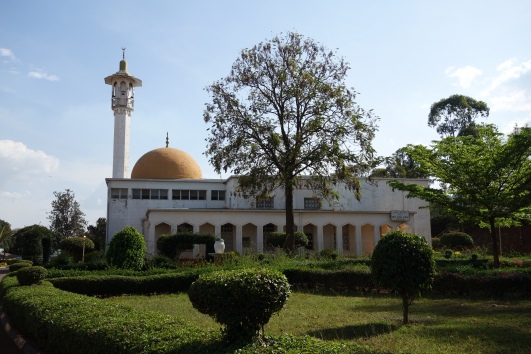 The 'centre culturel islamique' accomodates one of the biggest mosques in Rwanda's capital Kigali. Rwandans call it 'Gaddafi's mosque' indicating that the controversial leader paid for its construction.
The 'centre culturel islamique' accomodates one of the biggest mosques in Rwanda's capital Kigali. Rwandans call it 'Gaddafi's mosque' indicating that the controversial leader paid for its construction.
A young boy races through the narrow alleys of the Muslim quarter of the city in the Rwandan capital Kigali. There is a knife in his back.
Wide eyed, he searches desperately for somewhere to hide from his pursuers, the Hutu militia Interahamwe.
Anoura Mukamusoni's son opens the door to their house and pulls him in. "Don't worry, no one will find you here" whispers the mother. She pulls the knife out of his back and provisionally attends to his wound.
This is how Mukamusoni, a Muslim, remembers the day on which her son brought around twenty people into the house, who she hid throughout the genocide.
At least 800, 000 Tutsi and moderate Hutu were murdered by radical Hutu militias in Rwanda between April and July 1994. Since then Rwanda has been one of the biggest genocides in human history.
However, the Tutsi who Anoura Mukamusoni hid in her house in the Muslim quarter Nyamirambo were all saved.
Muslim rescuer: "I didn't have a weapon, but I had my mouth"
"I should write a book about it one day", jokes the now 52 year old and her deep, hearty laughter makes her entire body shake. She stands in the same living room as she did 21 years ago.
In the time between, she has furnished it with yellow curtains and the oversized leather sofas, which are so popular amongst Rwanda's middle and upper classes. All along the wall there are so many seats that a single visitor almost vanishes within them.
Her house, in which she lived with her four children and her domestic workers in 1994, lies near the main road in Nyamirambo. On their flight through the Muslim quarter, many persecuted Tutsi came past her house.
There was always someone knocking on the family's door in desperation. Anoura Mukamusoni opened it. Every time.
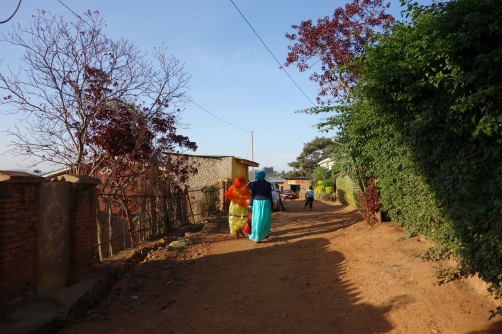 One of the wide roads in the Muslim quarter Nyamirambo. The quarter is characterised by numerous twisting, narrow alleyways, in which only those who know the place can find their way.
One of the wide roads in the Muslim quarter Nyamirambo. The quarter is characterised by numerous twisting, narrow alleyways, in which only those who know the place can find their way.
Some of the persecuted Tutsi and moderate Hutu stayed for several months, others stayed just one night and then tried to leave Kigali.
"I didn't have a weapon to defend myself and those in my house, but I had my mouth"!
Anoura Mukamusoni taps her fingers on her lips in a lively gesture and laughs.
Genocide survivor Mukarubayiza: "In 1994 all of a sudden people changed completely"
In the small alleyway that you need to take from the main road to reach Anoura Mukamusoni, there is one more house standing behind a stone wall. This is the home of former primary school teacher Cécile Mukarubayiza.
It's almost six o' clock in the evening, the time at which night falls over Rwanda's many hills. The last beams of light shine through the drawn curtains in Mukarubayiza's small living room.
The 70 year old is sitting in an armchair holding a copy of the bible. On the table there is a vase with red flowers in it, a picture of Jesus is mounted on the wall. She is just about to set off for her nightly prayer circle.
As a member of the Tutsi minority, her life was in danger during the genocide. Together with her children, she holed herself up in her house and hoped to remain undiscovered.
"During the genocide, all of a sudden people changed completely", remembers Mukarubayiza. "Really completely… all of sudden they all went crazy".
The faithful Christian shakes her head thoughtfully. A gentle smile lies on her face.
"Here in our quarter, most people stayed as they had been. That was really very lucky."
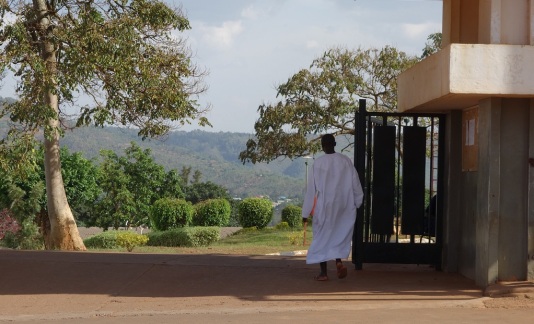 Muslim believer on his way to the mosque
Muslim believer on his way to the mosque
At that time, death squads roamed through the quarter, looking for houses with Tutsi occupants. One day they also came to Mukarubayiza's front door.
"We only survived", stresses the 70 year old, "because my neighbour rigorously chased them away."
In fact, Anoura Mukamusoni also cared for Mukarubayiza in 1994. She passed her four children off as her own, so that they could play outside without being in danger.
As the Hutu militia came to murder her neighbour, Mukamusoni stood in their way: "No one lives here anymore", she lied, straight to the faces of the young men. "I have already taken over this house."
During the genocide, it was common for the neighbours of Tutsi to first kill them and then take their belongings for themselves. Convinced by the words of the woman in a headscarf and the many little children, the murderers moved on.
"Islam teaches me that your neighbours are your family"
Obviously, I was afraid, the now 52 year old admitted. If it were found out that she had helped Tutsi, she would have been lynched on the spot. Hutu who did this were seen as traitors to the country.
As a wealthy Muslim woman, belonging to the majority group, without her actions she would have had nothing to fear.
"I had sometimes thought about whether I might simply leave. I could travel without any problems and I had money then too", said Anoura Mukamusoni.
"But Islam taught me that your friends are also your family and I knew that these people would die if I left".
Mukamusoni stayed and fed the people in her house with food from her household.
She went shopping in a remote part of the city. Only there could she be sure that she would not arouse suspicion if she bought unusually large amounts of food.
"In the Koran it states that true believers love their neighbours as they love themselves"
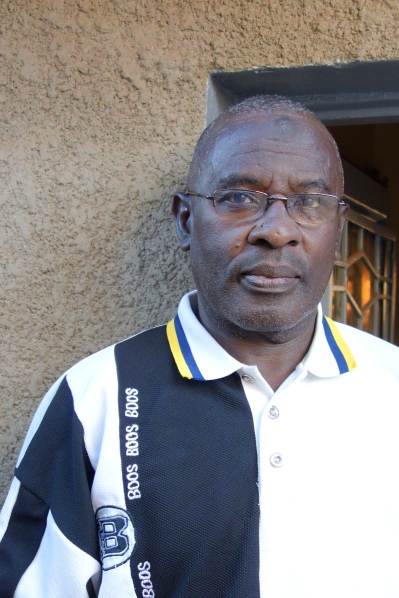 Yahaya Nesengiyumva. His story is shown in the permanent exhibition of the Kigali Genocide Memorial as a positive example.
Yahaya Nesengiyumva. His story is shown in the permanent exhibition of the Kigali Genocide Memorial as a positive example.
Owing to his Muslim convictions, the 67 year old Yahaya Nesengiyumva felt compelled to hide persecuted people inside his house.
"I am positive I did the right thing. In the Koran it states that true believers love their neighbours as they love themselves. Indeed, regardless of their religion".
Between 30 and 40 people turned to the head of the street for help. Nesengiyumva, then married to a Tutsi himself, found place around his house for everyone.
Rifles, to keep the Hutu militia away
The man facing old age, whose eyes always appear to be smiling, points to the small terrace in front of his house: "This is where I used to sleep, together with the other men. Only the women and children were inside".
He sometimes gave rifles to his son and the other young men so they could fire warning shots from the house to keep the Hutu militias away.
However, one day a few people found out that he was hiding Tutsi. They sent the Hutu militia, who threw explosives into his courtyard. By some miracle, they failed to go off.
Those in hiding sought refuge in other places for a few days. Then they came back to Nesengiyumva.
5th July was planned to be a day of death
The car mechanic repairs busses that were affected by the carnage of the genocide. In exchange, he receives food staples, with which he can feed his household. Sometimes his daughter is even able to get a bit of sugar in return for these.
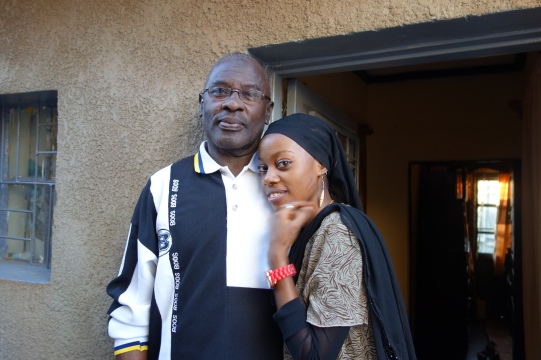 Yahaya Nesengiyumva with one of his daughters.
Yahaya Nesengiyumva with one of his daughters.
The people he protected live on. Only after the genocide did Yahaya Nesengiyumva discover how narrowly he and his guests avoided death a second time.
"We received a list of names to see all of those who should have been killed on 5th July. My name was on the list".
However, shortly before this date the murders came to an end.
"'My god! 'That was the first thing I said when I found out", Nesengiyumva laughs and makes himself comfortable in his living room.
On the wall, many things are chaotically arranged together. Lots of different objects such as a colourful map of Africa with recognisable borders and a gourd, out of which traditional banana beer is drunk in Rwanda.
A thick wooden wall cabinet fills out the part of the room, underneath which masses of glasses, cups and plates can be seen. It is as if he were prepared at any time to take in anyone seeking help.
Murder under the influence of alcohol
Yahaya Nesengiyumva cannot explain why in 1994 many Muslims didn't get involved in the killing, whilst the adherents of other religions became murderers.
"I am aware that around the world there is no religion that calls for the killing of others. The Muslims who commit terrible acts around the world have misunderstood the Koran".
However, he also adds: "During the genocide, many men committed murder under the influence of alcohol. Perhaps abstinence from alcohol helped Muslims to not get involved with the killing".
Yahaya Nesengiyumva leisurely takes off his slippers and walks outside in the last bit of sunshine in front of his house.
Precisely where more than 20 years ago the young men were lying awake with their rifles. He blinks happily in the light through his reflective sunglasses.
Disclaimer:Everyone posting to this Forum bears the sole responsibility for any legal consequences of his or her postings, and hence statements and facts must be presented responsibly. Your continued membership signifies that you agree to this disclaimer and pledge to abide by our Rules and Guidelines.To unsubscribe from this group, send email to: ugandans-at-heart+unsubscribe@googlegroups.com




0 comments:
Post a Comment